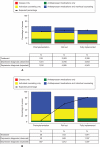Improved Perinatal Depression Screening, Treatment, and Outcomes With a Universal Obstetric Program
- PMID: 27054938
- PMCID: PMC4972038
- DOI: 10.1097/AOG.0000000000001403
Improved Perinatal Depression Screening, Treatment, and Outcomes With a Universal Obstetric Program
Abstract
Objective: To evaluate whether universal prenatal and early postnatal screening for depression leads to increased detection, subsequent intervention, and improved depressive symptom outcomes.
Methods: We conducted a population-based retrospective cohort study of 97,678 pregnant Kaiser Permanente Northern California members during three phases of the Universal Perinatal Depression Screening Program (preimplementation, rollout, fully implemented) from 2007 through 2014. Depression screening scores (Patient Health Questionnaire-9), depression diagnoses, individual counseling visits, demographic characteristics, and medication dispensings were extracted from electronic health records and pharmacy databases. The percentage of women screened, new depression diagnoses, and women receiving treatment were compared among the three phases (tests of trend). Changes in depressive symptom scores up to 6 months postpartum were assessed (rollout and fully implemented phases).
Results: A significant increase emerged in the percentage of women screened over the three phases ranging from less than 1% (n=122) (preimplementation) to 98% (n=41,124) (fully implemented) (P<.001). Identification of a new depression diagnosis increased from 8.2% (n=1,341) (preimplementation) to 11.5% (n=4,943) (fully implemented) (P<.001). Although the observed percentage of women receiving treatment decreased (60.9% [preimplementation] to 47.1% [fully implemented]), significant increases in the expected percentage of women receiving treatment emerged (42.6% [preimplementation] to 47.1% [fully implemented]; P<.05). Similar trends were noted for women with Patient Health Questionnaire-9 scores of 15 or greater (greater severity), highlighting an increase in expected percentage of women receiving treatment (5.9% [preimplementation] to 81.9% [fully implemented]; P<.05). In the fully implemented phase, improvements in depressive symptoms up to 6 months postpartum were noted.
Conclusion: These data provide evidence of benefit for universal perinatal depression screening programs regarding depression identification and treatment receipt and suggest improvement in symptom outcomes for women in screening programs, especially among integrated health care systems.
Figures
References
-
- Organization WH. The World Health Report 2001: Mental Health: New Understanding, New Hope. Geneva: 2001.
-
- Gavin NI, Gaynes BN, Lohr KN, Meltzer-Brody S, Gartlehner G, Swinson T. Perinatal depression: a systematic review of prevalence and incidence. Obstetrics and gynecology. 2005;106:1071–83. - PubMed
-
- Li D, Liu L, Odouli R. Presence of depressive symptoms during early pregnancy and the risk of preterm delivery: a prospective cohort study. Hum Reprod. 2009;24:146–53. - PubMed
-
- Beck CT. The effects of postpartum depression on maternal-infant interaction: a meta-analysis. Nurs Res. 1995;44:298–304. - PubMed
-
- Murray L. The impact of postnatal depression on infant development. J Child Psychol Psychiatry. 1992;33:543–61. - PubMed
MeSH terms
Grants and funding
LinkOut - more resources
Full Text Sources
Other Literature Sources
Medical


